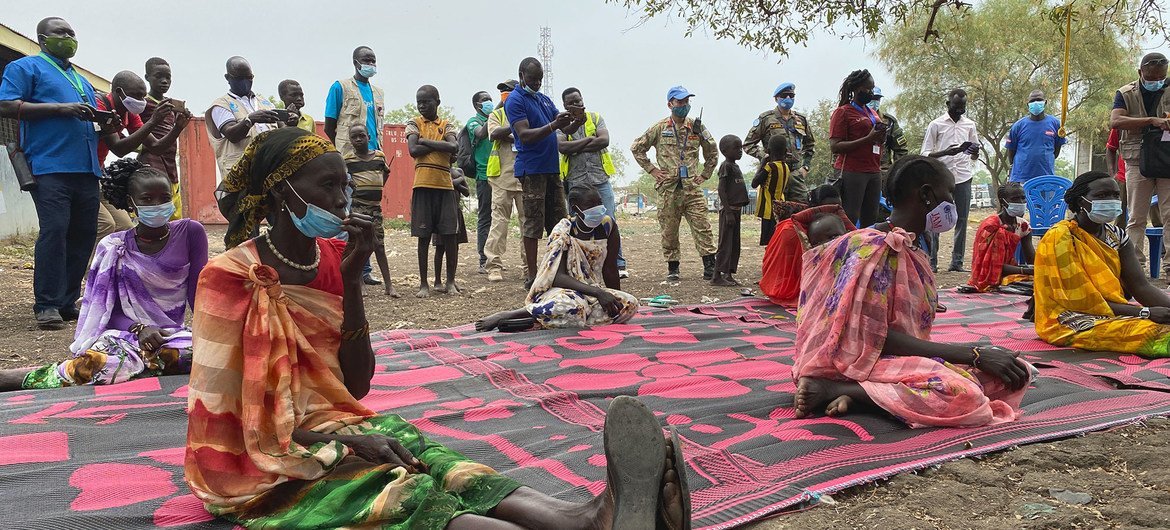This Is How Violations Were Committed Against the Citizens of South Sudan

Jointly published by the UN Mission in South Sudan (UNMISS) and the Office of the UN High Commissioner for Human Rights (OHCHR), a new report revealed flagrant violations of international human rights law and gross abuses of international humanitarian law in Unity state in South Sudan.
The report stated that 173 civilians were killed in four months amid ongoing fighting.
These violations occurred during clashes between the joint government forces and their militias/armed groups on the one hand and elements of the opposition Sudan People's Liberation Movement/Army—loyal to First Vice President Riek Machar—on the other.
'Violations With Impunity'
The report, which covers the period between February 11 and May 31, 2022, was based on 32 verification missions conducted by UNMISS in three counties: Koch, Leer, and Mayendit.
The fighting in Southern Unity State affected at least 28 villages and shelter sites. Approximately 173 civilians were killed, 12 were injured, and 37 women and children were abducted, according to the report.
"Many of the abductees were subjected to sexual violence, including girls as young as eight-years-old and a nine-year-old girl who was gang-raped to death. A total of 131 cases of rape and gang rape were documented. Approximately 44,000 civilians were displaced from at least 26 villages," it said.
The mission identified joint government forces and allied militia, reportedly operating under the command of officials in Koch and Mayendit districts, as the main perpetrators of human rights violations and abuses.
The opposition Sudan People's Liberation Army (SPLA) also launched attacks in Mirmir Payam, Koch County.
Special Representative of the Secretary-General (SRSG) and Head of UNMISS, Nicholas Haysom, said that "human rights violations were committed with impunity," stating that "the Government is duty-bound under international law to protect civilians, investigate allegations of human rights violations and hold suspected perpetrators accountable in compliance with fair trial standards."
Covering Up Crimes
In his interview with Al-Estiklal, human rights activist, Walid Abdelghani, said that the "South Sudanese army regularly carries out egregious criminal abuses, such as executions and torture, with impunity, and they won't stop if the efforts to address this issue are still weak and focused only on low-ranking officers."
"The army must issue unequivocal orders, followed by swift action to ensure that these crimes are not ignored or tolerated, as required by the Human Rights Watch," he added.
Abdelghani recalled one of these cases in which 4 soldiers publicly shot civilians and killed them, while the authorities did not question the suspected crime.
He stated that "two other civilians remain in detention without charge, and no one could visit them, civilians should never be detained in military facilities, the authorities should release detainees and ensure that all military officers implicated in these criminal abuses are held accountable in civilian courts."

The activist stressed that "violations, such as extrajudicial executions, have been going on in southern Sudan for several years and are now witnessing an unprecedented escalation. Several reports confirm that the National Police Service has always had a connection with the army crimes."
Abdelghani pointed to the weak institutional capacities, including the judiciary, which lead to prolonged delays in justice and contribute to the almost complete absence of the rule of law.
"This weakness, in fact, has been deliberately exploited to resort to extrajudicial executions to gain public support in certain communities, and some of them are, in fact, supportive of extrajudicial executions simply because they have lost faith in the justice system and such public executions will discourage abuse but what is happening is totally the opposite, this is promoting impunity and seriously undermining the rule of law," he stated.

The Government's Responsibility
Human rights have dramatically deteriorated in many areas of South Sudan, and many human rights organizations have for long talked about the terrible violations in this country that has been witnessing a civil war since late 2013, and cases of sexual abuse, looting, and child recruitment are still continuing in the country.
Commissioner Andrew Clapham talked about extrajudicial executions, also saying that an absolute ban is necessary for such executions.
Process of law must be ensured for those accused of criminal activity, including access to a fair trial, according to Clapham.
He added that the Government of Southern Sudan is responsible for preventing arbitrary killing practices by the security forces and said it is deeply worrying that the state has not conducted any credible investigations into the numerous extrajudicial executions in Warrap State, and it must do so urgently.

The Commission on Human Rights in South Sudan was established by the Human Rights Council in March 2016, and its work was extended in March 2017, then in 2018, 2019, 2020, and finally in March 2021. Its mandate is to identify and report facts and circumstances, clarifying responsibility for alleged grave violations and abuses of human rights and related crimes, including sexual and gender-based violence, to end impunity and provide accountability.
It called on the Government of South Sudan to stop extrajudicial executions and prompt impartial and independent investigations into all such executions in Warrap State, but none of that happened.
Sources
- South Sudan: Human rights violations in Unity state committed with ‘impunity’
- killing and torture..Human Rights accuses the South Sudan army of carrying out and covering up heinous criminal violations [Arabic]
- UN decries killings of 173 civilians in South Sudan's northern state
- UN: 173 civilians killed in 4 months, amid continued fighting in South Sudan








